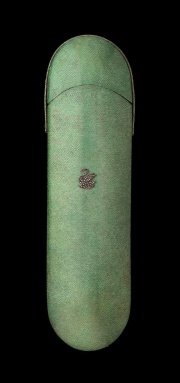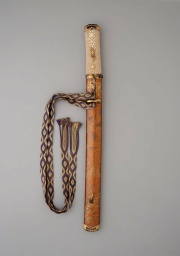Difference between revisions of "Galuchat leather"
Jump to navigation
Jump to search
| Line 12: | Line 12: | ||
<gallery> | <gallery> | ||
File:Rayskin dyed.jpg|thumb|Dyed rayskin<br>[https://www.etsy.com/shop/HolbertCraftCreation Holbert Craft Creation] | File:Rayskin dyed.jpg|thumb|Dyed rayskin<br>[https://www.etsy.com/shop/HolbertCraftCreation Holbert Craft Creation] | ||
| − | + | File:Rayskin dyed closeup.jpg|thumb|Close-up image of pebbled surface on dyed rayskin<br>[https://www.etsy.com/shop/HolbertCraftCreation Holbert Craft Creation] | |
</gallery> | </gallery> | ||
Revision as of 10:34, 5 September 2024
Description
A rough surface Leather produced from the skin of rays and sharks. Galuchat leather, named for the French casemaker, J. Galuchat, was first made in the 18th century. The hard and durable skin is prepared with the natural pearly gray or dyed green color. It was used in the 18th century for small decorative items, scientific instrument covers and sword hilts. Galuchat leather is still made in Japan and is used to trim purses. It was sometimes incorrectly called Shagreen because both had a pebbly surface and were often dyed green.
Synonyms and Related Terms
galuchat (Fr.); pearl sharkskin; shagreen; rayskin; ray skin; sharkskin
Additional Images
Dyed rayskin
Holbert Craft CreationClose-up image of pebbled surface on dyed rayskin
Holbert Craft Creation
Resources and Citations
- J.Gopfrich, "The Granulated Donkey? Shagreen; Some Aspects of Conservation" in ICOM Preprints, Lyon, 1999. p. 685-690.
- G.S.Brady, Materials Handbook, McGraw-Hill Book Co., New York, 1971 Comment: p. 704
- Matt Roberts, Don Etherington, Bookbinding and the Conservation of Books: a Dictionary of Descriptive Terminology, U.S. Government Printing Office, Washington DC, 1982
- Tom Rowland, Noel Riley, A-Z Guide to Cleaning, Conserving and Repairing Antiques, Constable and Co., Ltd., London, 1981



